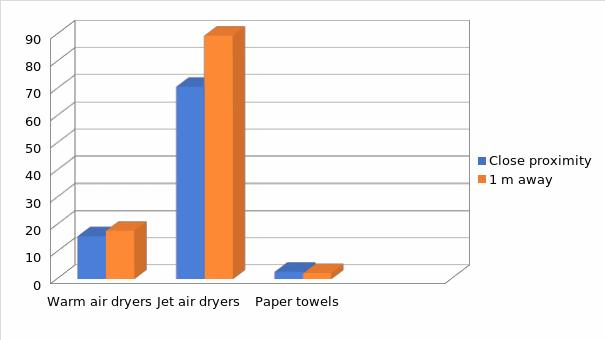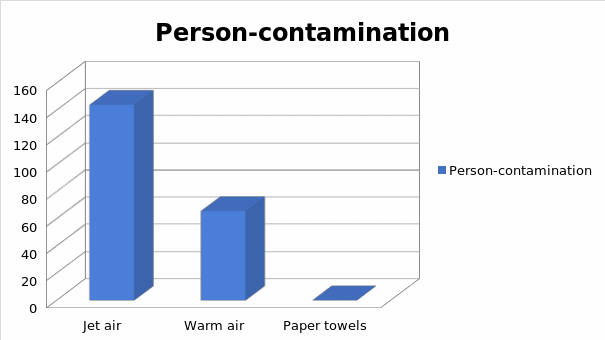Background
It is widely promoted that one must wash their hands after visiting the restroom. It is also necessary to dry one’s hands after washing them, because wet surface serves as the nurturing environment for bacteria. To make the hand drying process faster warm air and jet air hand dryers were placed in the restrooms all around the world.
They are believed to be more efficient than paper towel dispensers, because using hand dryers one does not have to touch anything in the room. Many contemporary researchers note that the warm air coming from the hand dryers is far from being sterile and may serve as the perfect environment for airborne bacteria.
Research question
The effectiveness of hand dryers over paper towels in reference to the maintenance of sanitary conditions
Hypothesis
Towel dispensers may be old-fashioned, but they are much safer in relation to airborne bacteria spreading.
Prediction
Hand dryers tend to collect bacteria and then stream them on people’s hands with the flow of warm hair.
Source
PubMed Heath website.
Data
The research involved warm air and jet air hand dryers along with paper towels. Contaminated gloves covered in lactobacilli bacteria solution were dried with each of the devices. Afterwards, other participants used the dryers, and the number of bacteria on their hands afterwards was measured in close proximity of the dryers and one meter away.
The results of the research measured that the count of bacteria spread by the jet air dryers (70.7 colony forming units) was four and a half times higher than the one of warm air dryer (15.7) and twenty seven times higher than that of paper towels (2.6) (Air dryers ‘blown away’ by paper towels in germ tests par. 24).

The results measured one meter away of the dryers were similar and showed 89.7 colony forming units for jet air dryer, 18.7 – for warm air dryer and 2.2 for paper towels (Air dryers ‘blown away’ by paper towels in germ tests par. 25). The research also showed that the distribution of bacteria does not hit only hands, but the whole upper body, and bacteria can be still in the air fifteen minutes later the drying procedures (Restroom Hand Dryers Spread More Germs than Paper Towels, Study Finds par. 5).
Person-contamination experiment involved black paint instead of the bacteria and the users wore white suits, to detect which areas of the users’ bodies were hit the most. Paper towel dispensers did not produce any paint spots, while jet air dryer users’ suits counted 144.1 spots and those of warm air dryer users – 65.8 spots (Air dryers ‘blown away’ by paper towels in germ tests par. 29).

Conclusion
The research was conducted in November this year, it is relatively new, but the hypotheses existed for at least a year. The data collected during the research is reliable and sufficient to present strong proofs of the theory. One limitation this research has it that the contaminated hands were placed under the dryers without washing, which assumes that a person would use the dryer right after using the toilet but skipping the hand washing procedure.
The research is important because airborne bacteria present serious danger in the contemporary world, so all possible ways of spreading them need to be detected and addressed. The conclusion of this research points out one of such ways. Its reduction is possible and easy. Findings of the research show that paper towel dispensers are much safer than hand dryers in relation to spreading airborne bacteria as the number of colony forming units on distributed by paper towel dispensers was significantly smaller than that of the dryers.
Works Cited
Air dryers ‘blown away’ by paper towels in germ tests. PubMed Health. 2014.
Restroom Hand Dryers Spread More Germs Than Paper Towels, Study Finds. Drugs. 2014.